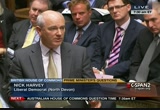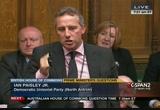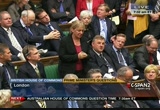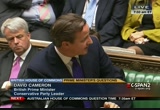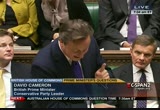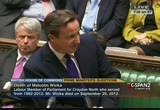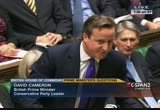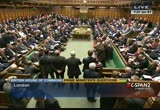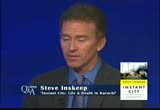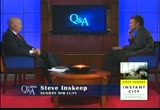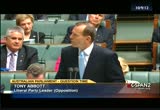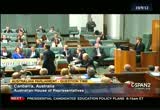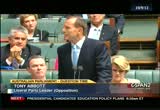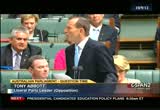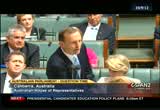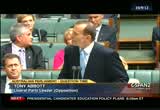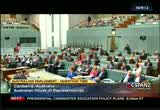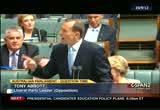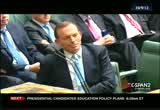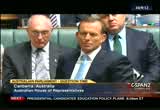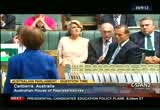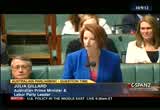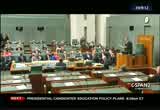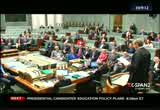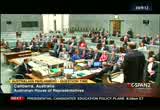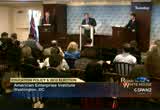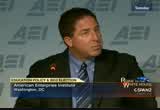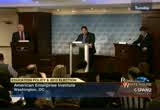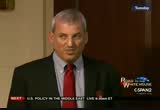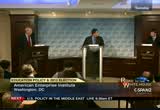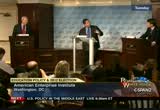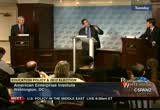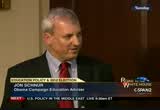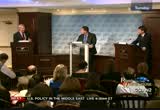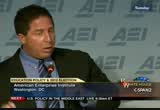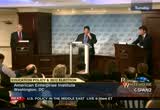tv Today in Washington CSPAN October 17, 2012 7:30am-9:00am EDT
7:30 am
the vehicles all need paying for the same time. this has to come out of defense budget and austerity is with us for sometime yet. with the prime minister keep an open mind on how exactly to replace our nuclear deterrent? >> first of all, what i would say to my right honorable friend is a list of things that he goes through are all programs that are fully funded and probably going to be invested in because this government has sorted out that he knows because he played a major role, sorted out and the defense budget. what i would say to him, i look at this issue carefully, i don't believe we would save money by adopting some alternative nuclear deterrent posture but and also you have a nuclear deterrent i think it makes sense to make sure it's something that is credible and believable otherwise there's no point in having one at all. >> there are record levels of support for the british union. and every simple the prime
7:31 am
minister will now that 7%, only 7% of the popular -- population of northern on what a united ireland to that only rises to 32% in 20 years time if asked the question then. does the prime minister of korea that the agreement that he signed up to this week to ensure that there's a single decisive quest -- question asked on the scottish and british, that is not up to him and his house to unite -- [inaudible] and support the union -- [inaudible] for ever? [laughter] >> i'm delighted -- i'm delighted to answer the most positive way that i can to his question. i'm very pleased that we've reached an agreement with the scottish government to have a single, simple question and
7:32 am
irreverent that must be held before the end of 2014 so he can put beyond doubt the future of the united kingdom. and i hope that everyone will vote to keep the uk together, and i know this will cross party support. i hope the politicians are all parties would agree to share platforms together. i both is your platform within. maybe i will get my chance. >> recently a club in a town in my constituency lost their lives and. the one thing residents learned is it doesn't matter if it's an center at our lap dancing club in a beautiful market town, local people of absolutely no weight whatsoever in planning law. with the prime minister agree with me -- [inaudible] that their voice should be heard?
7:33 am
>> i think my honorable friend speaks for many people about the frustration of the planning system can sometimes deliver but i would make 2.4 think we're making some progress. first of all we changed the laws to give planners greater power to alter licenses but i think they can apply to the source of premises she refers to. the second thing is under our plans people can write neighborhood plans which give far greater control to residents about the shape of their british committee. i would encourage her to take up the specific issue with the department communities and local government to see if there's some anything more we can do. >> could i thank both benches for the tribute to the police officers who were murdered in manchester recently. on the thing though of policing, there are nearly 7000 front-line police that have had disappeared from her system. the prime minister promise that wouldn't be the case. was the prime minister -- by lasse questioned him in this
7:34 am
house, give me a straightforward answer, would he give a commitment that will be no more of what happened to policing in england and wales? >> prejudge the wisdom of the great electric but i wish the honorable gentleman welcome if he is successful. the point i would make to them is to point out the chief constable of his own force will make to him, and i think said very effectively wind the chief constable said this. they cannot be measured by the number of officers but by reductions in crime. that is what he said. crime in manchester is down 12% i think we need to recognize the fact that there are difficult decisions and, frankly, the labour party was committed to even greater cuts in budgets and we've delivered. they key is democrat down on the paperwork, can help to the police out on the beat? can we help them do the job they do and can we cut crime? the answer in this case is yes, we can.
7:35 am
>> could i join prime minister and later opposition being treated to malcolm wicks whose memorial service is the stride. he was an outstanding local mp. a decent man and a good friend to is there one way we can honor his memory to improve our national health system so that more and more people each cancer and don't have their lives so tragically cut short? >> my honorable friend speaks for the whole house and what he says about malcolm wicks. i understand that the offer just to drive malcolm home after the vote, and malcolm referred to your cart i think as they can't come at and that there apparently was a bottle of wine at christmastime. i think will make sure he lays off the but it is a good arrangement between members. one of the greatest things we can do remember malcolm is ensure the continued success of the cancer drugs fund which is held over 20,000 people and make sure people can get the urgent treatment as well as urgent drugs. >> the secretary of state of education said this weekend that
7:36 am
if there were a referendum on britain's continued members ship of the e.u., he would vote to leave. a third of the cabinet agree with them. how would the prime minister vote? >> as i said i don't want an in house referenda because i'm not happy with us leaving the opinion you. but i'm not happy with the status quo either. i think with a passenger at this country wants is a new settlement with europe and that settlement being put to -- that's what we'll be going in a manifesto and if they do get a ring endorsement from the british people. it last but not least, sir tony. >> does by right honorable friend agreed that there was no structural deficit at the top of the boom, as claimed by the shadow chancellor? >> i think by right honorable friend makes an important point which is in the imf reforms out this week it shows the structural deficit in 2007 at the height of the boom was 5% of
7:37 am
our gdp, or actually 73 billion pounds. now the shadow chancellor said there was a structural deficit, and i think this really demonstrates just how little they have learned. now mr. speaker, we're talking about our plans for the british economy. how we're going to compete and succeed. we know their plans for this weekend to go on a giant marched with her trade union people. that is how the leader of the opposition is going to be spinning his we can, the most lucrative sponsored walk in history. >> order. [shouting] >> order. point of order. dr. julian lewis. >> from london you've been watching prime minister's question time, air to live every wednesday while parliament is in session at 7 a.m. eastern here in c-span2, you can see it again
7:38 am
sunday night at 9 p.m. eastern and pacific on c-span. for more information go to c-span.org. on the homepage click on international for british parliament, and other legislatures around the world. also links international media and c-span programs on world issues. >> it's a movie theater that i write about. i had gone to visit it. it's been there since 1947 which is the founder of the country. it showed films of all over the world from the united states, from england, from hollywood in india, and to me it symbolized the resilience of the country and the openness of the country in spite of all the violence of troubled people have suffered over the last me decades in pakistan. and during one of the protests against a video that insulted
7:39 am
the prophet mohammed, had a very negative image of the prophet mohammed, during one of the protest people turned against movie theaters and burned them. i don't really see that as a protest against the west. i don't really see that as a protest against the united states even though avatar, you could've gone to see at this theater. you had islamists activists who have not liked these movie theaters for decades. the way before this prophet muhammed film, which was never shown any way. and so they grabbed an opportunity to attack and they with a bunch of young people to go teenagers involved, still silversmiths back bar on the way to burn this movie theater, just torture. and argue in that piece that what they really attacking was the nature of their own country which perhaps he did not understand. and i say that with the greatest respect. who am i as a foreigner to say
7:40 am
what your country is about? and but i do know from having listened to pakistanis themselves that it's an incredibly diverse place. it was born as an even more diverse place than it is today. lots of different cultures, lots of different traditions, lots of different ways. that movie theater symbolized pakistan, and that is what people burned when they set it on fire. >> more with "instant city" author steve inskeep sunday at eight on c-span's q&a. >> now, highlight some the october 9 session of question time in the australian parliament. they focus on issues surrounding the speaker of the house who has been charged with sexual harassment and fraud. after the debate, the speaker one in no confidence vote but resigned several hours later. prime minister julian gillard and opposition leader spoke
7:41 am
about that and women's rights. this program is courtesy of aipac, austria public affairs channel. >> hello, welcome to washington. it was another extraordinary week in australian politics with the speaker of the house under increasing pressure to resign his post to the atari step aside what i sexual harassment court case brought by former staffer went on to during the course of that case text messages between the pair emerged showing crude language and bad attitude towards women. and sensing a political victory, the opposition moved to dump him, seeing it was the governor put a miniature. this is a question time started during the week.
7:42 am
>> thank you, madam chair the speaker. i move as provided for by section 35 of the constitution, the speaker be removed from office immediately. and at the risk of detained the house and repetitive way, madam deputy speaker, that it is absolutely crystal clear that the speaker is no longer a fit and proper person to uphold the dignity of this parliament and is no longer a fit and proper person to uphold for standing orders of the south. and they say, madam deputy speaker, that the speaker is not disqualified pioneer fact of in legal actions against them. that can befall any member of this house. and of itself should not be a disqualification from high office. what, madam deputy speaker, must nevertheless be held to this
7:43 am
theater, the and denied, uncontradicted faqs that have emerged, which continue to emerge in the course of the case currently on vote against the speaker of this parliament. activist, madam deputy speaker, of dismay and the public, i must allude and that only alluded to the gross references which are contained in the uncontradicted and denied evidence before the court about the conduct of the speaker. i must allude that deputy speaker to the file and comical references to which this speaker appears to be addicted in his text message, and madam deputy speaker, there is a clear bias, the clear bias in and denied in uncontradicted evidence before a court against a member of this house by someone who is charged
7:44 am
to without fear or favor, by someone who is charged impartially towards all members of this house, by someone who is charged with the upholding understanding orders of these house about fear or favor against or in favor of any single member. the newest member, e.u. the father of the house, this speaker is charged with upholding the standing orders impartially for and against all members of this parliament. and on the face of the a and denied evidence before the court, this speaker cannot do that. this speaker has not done that. that is why, madam deputy speaker, this particular speaker is no longer a fit and proper person to be a speaker of this house. but madam deputy speaker, it's not just the speaker who
7:45 am
assailed a character test. it is indeed as primera -- this prime ministers failed. this a prime minister and picked the current speaker for the top job of this parliament. this prime minister orchestrated the resignation of the former speaker, a man of undoubted character, a man of undoubted quality and a man of undoubted impartiality in the conduct of this chamber. >> does anyone think for a second a man who loves this parlor, who loves the speakership as he loved his life? does anyone think as a former speaker of the parliament would have resigned to spend more time with his colleague in the caucus? [laughter] >> that's terrible. >> asked a member of the bank what it is like these days. does anyone think a member
7:46 am
really resigned to spend time with members of the caucus? clearly, the members resigned the speakership because he had been instructed by the prime minister, a prime minister engaged and who masterminded a policy to shore up our numbers in the parliament. and mark my words, madam deputy speaker, mark my words, madam deputy speaker, what we will shortly see from this prime minister and ministers in this government is a defense of the indefensible. is an attempt to say that someone who has clearly failed the character test is worthy of sitting in the greatest share of this parliament. well, i say to this prime minister just as the state has failed the character test, you, prime minister, are about to fail a judgment test. and every day that you, prime
7:47 am
minister, run a protection racket for the current speaker, just as you ran for months and years a protection racket for the number of those, you indicate your unfitness for higher office. madam deputy speaker, last november when the prime minister said she was about to lose the support because she knew she would not be able to deliver on her poker machine pledge, she cooked up this deal. she knew she was about to lose the support of the member for dennis and. she feared she was about to lose the support in the parliament of the member. she was apprehensive then as always about the actions of the former prime minister, so in conjunction with the leader of the house, the member, she dreamt up this brilliant political we've. she dreamt up this tactic,
7:48 am
nevermind the political assassination of the well respected speaker of the parliament, she knew then as always i'm discussing death squads, -- [inaudible] nevermind, nevermind that the squalor to deal with the prime minister cooked up last november involved a chair in this parliament someone whom her own government, someone whom her own government was investigating for misuse of entitlement. all that matters to this prime minister, all that mattered to this prime minister last november when this brilliant political maneuvering was being dreamt up was mattress in her position in the parliament. that's all that ever matters to this prime minister.
7:49 am
her own survival in this parliament. and madam deputy speaker, what is now absolutely apparent is that while members on this side of the house were attempting to maneuver this speaker out of the parliament, the prime minister and members on the other side of the parliament were giving him the biggest job in this parliament, apart from the prime ministership itself. and in the process of managing, not out of the parliament into the speakership, this prime minister -- do i do, nothing at all but discharge the duties of the speakership and a fair and impartial manner. not sufficiently partial to satisfy the prime minister and the leader of this house. so madam deputy speaker, let's be absolutely crystal clear about the situation in this parliament right now.
7:50 am
this speaker is this prime minister's creation. this speaker's actions are this prime minister's responsibility. and this speaker is standard status at this prime minister's status, unless she has the responsibility of the decency to remove this speaker from his high office. and madam deputy speaker, we know, we know because we have been observing this prime minister now for a long time in this parliament. we know that sorry is the one word she can say. we know i was wrong is the wrong -- the wednesday by she she can make. well, i say to this prime minister please, for the sake of this parliament, for the sake of this country, for the sake of ordinary status of decency, admit that you got it wrong when
7:51 am
you engineered the member for fisher into the speaker's chair, and just say sorry. just apologize to this parliament for the travesty that you have inflicted on us back in november last year. madam deputy speaker, as things stand, this whole sorry slipper saga just illustrates the apical, the ethical bankruptcy of this government. we've had minister after minister, just about knocking over the microphones to stand up for this speaker. we've had minister after minister tripping over themselves to defend this speaker. we had the minister of foreign affairs describing the accuser of the speaker as more of an active big red the leader of the house say that anyone that
7:52 am
criticizes the current speaker was guilty of engaging in the politics of personal destruction. we even had the leader of the house compare court action against the current speaker to watergate. i mean, what the sense of standard, what sense of proportion, what sense of perspective do these people have? but the worst of, madam deputy speaker, worst of all, madam deputy speaker, we had the one person in this house most charged with respecting due process, with respecting the ordinary processes of the courts, the first lower office of the crown, the first floor officer of this country, the attorney general herself she went out in public again and again and again and again, to say that those who were engaged in prosecuting this speaker was somehow guilty of an abuse of
7:53 am
process. she didn't say it once. it wasn't a slip of tongue in the heat of the moment. she went out and said it deliberately, cold-blooded and calculatedly again and again and again and again. and when the attorney general was picked up her, trick him and it's interesting, isn't it, madam deputy speaker, that the prime minister self, the prime minister herself is now saying oh, i couldn't possibly comment on something which is before the courts, oh, no, not me, not me. uphold stand, uphold decency, always wanting to give someone a fair go, oh, yeah, oh, yeah. well, this is what the attorney general said when picked up on the fact that she was prejudging a matter before the court. the attorney general said, i think it's unrealistic, given
7:54 am
the public interest in this matter, that there will not be commentary. and was it there chart, madam deputy speaker? there was comment after comment after comment. there was defamation after defamation after defamation of someone whose only fault was speaking to a certain -- his rights, his rights, and more, to the speaker of this parliament. but what happened? what happened, madam deputy speaker, since moore has been revealed about the real character, the real nature of the individual who holds the highest job that this parliament can bestow upon anyone? what's happened is that the attorney general has now taken the vow of a monk. the attorney general has now taken the vow of silence on this
7:55 am
matter, that the prime minister is not going to attempt to make. well, madam deputy speaker, total total hypocrisy. this is a government which is only too ready to detect sexism, to detect misogyny now less, until, until, madam deputy speaker, they find in one of their own supporters. and tell, madam deputy speaker, they find it in someone upon him this prime minister relies to survive in her job eric then, of course, no fault can possibly be found, no evil there be spoken. well, madam deputy speaker, the australian public are not monks. they know what is going on here. they know that this government is about to run a protection racket or something which is actually dashing contemptible for values which are utterly indefensible. madam deputy speaker, him not
7:56 am
only has the prime minister filed for judgment here, not only has the government filed the standards case, but this attorney general has filed this angle. she has dishonorably, dishonorably filed to defend the ordinary judicial process of this country. not only has the attorney general failed to defend judicial process, she has been the chief defender of the speaker himself. she has been running his defense rather than defending the court and the justice process of our country. madam deputy speaker, it is no accident, it is no accident that the member for banks has today resigned as chairman of the government. it is no accident that the member for banks has resigned today because the member for
7:57 am
banks must be only too well aware of the fact that back in november last year it was the member of banks who was forced, who was forced to nominate the current speaker for the position that he now holds. it was the member for banks it was forced by this government to endure 10 minutes of infamy. well, he stood in his place, while he stood in his place to assert the virtues of the member for fisher. well, and he knew it was wrong then. he's known that it was wrong every day since then. he's august the been hanging on his conscious, and now he has resigned. and i'm waiting for the member from melbourne port it was serving as will the honor of the member from fisher. an assertion that he knew then and has known every day since
7:58 am
then to be simply false. so far, so far the only honorable man opposite in this matter has been the member for banks. and i commend him. and i commend him for that. now i know, i know, madam deputy speaker, that the prime minister is in a difficult position today. she's already lost her caucus chairman. she's fighting to avoid losing her speaker. and ultimate what she is losing is the support of her caucus, too. well, just as she has lost the caucus chairman, she wonders her speaker. and i suspect she will shortly lose the caucus. because what this prime minister has done is shame this parliament. and should she rise in this place now, try to amend this big, try to say that she retains confidence in this speaker, she
7:59 am
will shame this parliament again. and every day the prime minister stand in this parliament to defend this speaker will be another day of shame for this parliament, another day of shame for a government which should already have died of shame. he never had been a speaker in his parliament. he shouldn't have been made speaker last november, and he shouldn't be speaker now. let me, let me simply remind the prime minister, who i presume it's about to rise to her feet in this parliament and defend her personal selection of the member for fisher as speaker of this place, she said back on the 24th of november last year, she said of this speaker that he had shown a fierce sense of
8:00 am
balance, and appropriateness. and appropriateness. this prime minister thinks that this speaker is a man of appropriate judgment. well, madam deputy speaker, but his prime minister now needs to do is to defend the conduct, the character, and the words of this speaker. .. >> to defend this speaker. the bonds between them will just be closer.
8:01 am
this prime minister should be ashamed of himself, she should be ashamed of her choice, she should be ashamed of her judgment, she should be ashamed of the fact she is now having to defend the indefensible. this speaker should be gone, this speaker should be gone today. >> those words died of shame had a potential meaning for the prime minister because -- a special meaning for the prime minister because just days earlier a popular broadcaster had used the the same phrase claiming that her father had died of shame because of his daughter's lies. that caused huge controversy here in australia, and while trying to protect peter, julie girard used it to try to turn it back on tony abbott in regards to his attitude toward women,
8:02 am
and she delivered a speech widely regarded as her best parliamentary performance, one that went viral around the world. >> i call the prime minister. >> thank you very much, deputy speaker, and i rise to oppose the motion raised by the leader of the opposition, and in so doing i say to the lead leader of the opposition, i will not be lectured about sexism and misogyny about this man, i will not -- >> order! >> not now, not ever. the leader of the opposition says that people who hold sexist views and are misogynists are not appropriate for high office. well, i hope the leader of the opposition has got a piece of paper, and he is writing out his resignation, because if he wants to know what misogyny looks like in modern australia, he doesn't need a motion in the house of
8:03 am
representatives, he needs a mirror. that's what he needs. let's go through the repulsive double standards, repulsive double standards when it comes to misogyny and sexism. we are now supposed to take seriously that the leader of the opposition so fedded by mr. slipper's -- is offended by the text messages when this is the leader of the opposition who has said, and this is when he was a minister under the last government, not when he was a student, not when he was in high school, when he was a minister under the last goth. he sad said -- has said and i quote in a discussion about women being underrepresented in institutions of power in australia, the interviewer was a man called stavros. the leader of the opposition says: if it's true, stavros, that men have more power generally speaking than women, is that a bad thing? [laughter] and then a discussion ensues,
8:04 am
and another person being interviewed says i want my daughter to have as much opportunity as my son, to which the leader of the opposition says: yeah, i completely agree. but what if men are by physiology or them bearment -- temperament to issue commands? then another discussion about -- >> order! >> -- modern society and the other person participating in the discussion says: i think it's very hard to deny that there is an underrepresentation of women, to which the leader of the opposition says: but now, there's an assumption that this is a bad thing. this ises the man from whom we're supposed to take lectures about sexism. and then, of course, it goes on. i was very offended personally when the leader of the opposition as minister for health said, quote: abortion was
8:05 am
the easy way out. i was very personally offended by those comments. he said that in march 2004, i suggest he check the record. i was also very offended on behalf of the women of trail l ya when the in course of this carbon pricing campaign the leader of the opposition said when the housewives of australia yield to do -- what the housewiveses of
8:06 am
8:07 am
apologize to me for the things that have come out of his mouth, but now seeks to use this as a battering ram against someone else. well, this kind of hypocrisy should not be tolerated which is why this motion from the member of the opposition should not be taken seriously. and then second, the leader of the opposition is always wonderful about walking into this parliament and giving me and others a lecture about what they should take responsibility for. always wonderful about that, everything that i should take responsibility for. now apparently including the text messages of the member -- [inaudible] always claims that others should claim responsibility, particularly me. well, can anybody remind me if the leader of the opposition has taken any responsibility for the conduct of the sydney young liberals and members of his front bench? has he taken any responsibility for the conduct of members of
8:08 am
his political party and members of his front bench who apparently when the most vile things were being said about my family raised no voice of objection? [inaudible conversations] no one walked out of the -- >> the minister's -- [inaudible] >> was not acceptable. instead, of course, it was all viewed as good fun until it was run in a sunday newspaper, and then the leader of the opposition and others started ducking for cover. big on lectures of responsibility, very light on accepting responsibility himself for the vile conduct of members of his political party. third, why the opposition should not be taken seriously on this motion, the minister of the opposition and the deputy minister have talked about the -- [inaudible] well, let me remind the
8:09 am
opposition and the leader of the opposition particularly about their track record and association with the member paul fisher. a reminder that the national party preselected the members for the 1984 election, that the national party preselected the members for the 1987 election. that the liberal party preselected mr. fisher for the 993 election, then for the '96 rex, then for the '98 election, then for the 2001 election, then for the 2004 election, then for the 2007 election and then for the 2010 election and, of course, many of those preselections meet -- [inaudible] for person support of the leader of the opposition. i remind the leader of the opposition that on the 28th of september, 2010, following the last election campaign when mr. slipper was elected as
8:10 am
deputy speaker -- >> [inaudible] >> the leader of the opposition at that stage said this, and i quote -- he referred to the members of -- [inaudible] who was also elect today a position at the same time and then as follows: and the member will serve as a fine complement to the members in the chair. i believe that the parliament will be well served by the teem which will occupy the chair in this chamber. i congratulate the member of fisher who has been a friend of mine for a very long time, who has served this parliament in many capacities with distinction. the words of the leader of the opposition on record about his personal friendship with mr. slipper and on record about his view about mr. slipper's qualities and attributes to be the speaker. no walking away from those words, they were the statement of the leader of the opposition then. i remind the leader of the opposition who now comes in here
8:11 am
and speaks about mr. slipper, and apparently his inability to work with or talk to mr. slipper, i remind the leader of the opposition he attended mr. slipper's wedding. did he walk up to mr. slipper in the middle of the service and say he was disgusted to be there? was that the attitude he took? no, he attended that wedding as a friend. the leader of the opposition came to lecture others about what they ought to know or did know about mr. slipper. well, with respect i'd say to the leader of the opposition after a long personal association including attending mr. slipper's wedding, it would be interesting to know whether the leader of the opposition was surprised by these text messages. he's certainly in a position to speak more intimately about mr. slipper than i am and many other people in this parliament given his long personal association. then, of course, then, of course, the leader of the opposition comes into this place
8:12 am
and says, and i quote, and says, and i quote: every day the prime minister stands in this parliament to defend this speaker will be another day of shame for this parliament, another day of same for a government which should already have died of shame. >> where's that fight? >> well, can i imitate the leader of the opposition? the government is not dying of shame, my father did not die of shame. >> here, here! >> which the leader of the opposition should be ashamed of, his performance in this parliament and the sexism he brings with it. now, about the text messages that are on the public record or reported in the -- >> [inaudible] >> that's a direct quote from the leader of the opposition, so i suggest those groaning have a word with him. now, on the conduct of mr. slipper and on the text messages that are in the public domain, i have seen the press
8:13 am
reports of those text messages, i am offended by their content. i'm offended by their content because i am always offended by sexism. i'm offended by their content because i'm always offended by statements that are anti-became. i'm offended by those things in the same they that i have been offended by things that the leader of the opposition has said and to doubt will continue to say -- no doubt will continue to say in the future because if this today was an exhibition of his new feminine side, well, i don't think we've got much to look forward to in terms of changed conduct. i am offended by those text messages. but i also believe in terms of this parliament making a decision about the speakership that this parliament should recognize that there is a court case in the progress, that the judge has reserved his decision, that having waited for a number of months for the legal matters
8:14 am
surrounding mr. slipper to come to a conclusion that this parliament should see that conclusion. i believe that is the appropriate path forward and that people will then have an opportunity to make up their minds with the fullest information available to them. but with whenever people make up their minds about those questions, what i won't stand for, what i will never stand for is the leader of the opposition coming into this place and peddling a double standard, peddling a standard for mr. slipper he would not sit for himself, peddling a standard for mr. slipper he has not done for other members of his front bench, peddling a standard for mr. slipper that has not been acquitted by the people -- [inaudible] to say the vilest and most revolting things like his former shadow parliamentary secretary senator benardi. i will not ever see the leader
8:15 am
of the opposition seek to impose his double standard on this parliament. sexism should always be unacceptable. we should conduct ourselves as it should be always unacceptable. the heeder of the opposition -- leader of the opposition says do something, well, he could do something himself. he could change his behavior, he could apologize for all his past statements, he could apologize for standing next to signs describing me as a witch and a bitch, terminology he's now objected to by the front bench of the opposition. he could change a standard himself if he sought to do so. but we will see none of that from the heeder of the opposition -- leader of the opposition because on these questions he is incapable of change. capable of double standards but incapable of change. his double standards should not rule this parliament. good sense, common sense, proper process is what should rule this
8:16 am
parliament. that's what i believe is the path forward for this parliament, not the kind of double standard and political game playing imposed by the leader of the opposition. now looking at his watch because, apparently, a woman's spoken too long. i've had him yell at me to shut up in the past, but i will take the remaining seconds of my speaking time to say to the leader of the opposition, i think the best course for him is to reflect on the standards he's exhibited in public life, on the responsibility he should take for his public statements, on his close personal connection with peter slipper, on the hypocrisy he has displayed in this house today. and on that basis because of the leader of the opposition's motivation, this parliament today should reject this motion, and the leader of the opposition should think seriously about the role of women in public life and
8:17 am
in australian society, because we are entitled to a better standard than this. >> here, here! >> the government won the vote to keep peter slipper in the chair by the slimmest of margins, 70-69. but after pressure from the cross bench, the whole deal came unstuck just three hours later when peter slipper resigned and a new speaker, anna burke, was elected to the chair. >> honorable members, i would like to take this opportunity of thanking the house this afternoon for its continued support and for the great privilege of serving as the 27th speaker of the house of representatives. i think particular hi those honorable -- particularly those honorable members who spoke in support of me. i appreciated the references to the friendships i have enjoyed with members across the spectrum over many years. it is, indeed, a great privilege to serve in this place and
8:18 am
particularly as speaker. despite the vote of the house in support of my continuation in office, i wish to advise that with great sadness i have decided that i should not continue as your speaker. accordingly, i'm having arrangements made to tender my resignation to her excellency, the governor general. the importance and the role of the house of representatives in australia is far more important than my future or my own continuation as speaker. i would like to thank madam deputy speaker, the honorable member chism, who has worked so diligently as deputy speaker in the recent difficult circumstances. she's been loyal, she's not
8:19 am
sought of to have her own position advanced, she has done everything that a deputy speaker should do. in fact, she's done more, and i want to thank the member chism, madam deputy speaker, for her personal friendship and personal support over the last six months. and no one would have expected, madam deputy speaker, that you would have had thrust upon you the responsibilities that have been thrust upon you in your capacity. i think we should all publicly thank you for the role that you have played. it's a wonderful privilege to serve in the parliament and, of course, the interest of the parliament are seriously more or important than the issue of any of us, and i respect this parliament too much to not put aside my personal interests. i do thank honorable members for
8:20 am
their indulgence, and i invite madam deputy speaker to retake the chair. >> i wish to express my grateful thanks for the high honor the house has pleased to confer on me. i hope i will seven the house as distinction and pride as only the second female speaker in this chamber. to the member fisher, i also want to extend my thanks for his delightful remarks, but also the incredible gracious way he stood aside this afternoon in very difficult circumstances. >> and so after another tense week in australian parliament, the government is back to where it started; a one-seat majority relying on the votes of peter slipper and craig thompson, both of whom may face criminal charges in the near future. so that's all from australian politics for this week, thanks for watching "question time."
8:21 am
♪ >> see the presidential debate monday night live on c-span, c-span radio and online at c-span.org. watch and engage. live today on c-span2 at 9:30 eastern, the middle east policy council looks at the issues the next administration will face in the region. then at noon the heritage foundation hosts a forum on the role of russia in the syrian civil war. and later at 2:30, a look at the global threat of ieds, improvised explosive devices. that's live today on c-span2. the american enterprise institute hosted a debate tuesday on the presidential candidates' plans for education policy. obama campaign adviser jon schnur defended the president's
8:22 am
policies in his first term while romney campaign adviser martin west addressed what a romney administration education plan would look like. this is an hour, 20 minutes. >> here at the american enterprise institute. delighted to have all of you with us today for this conversation, education reform in the next white house, a conversation with the obama and romney campaigns. we have with us today two of the more prominent surrogates who have advised both president obama and governor romney on issues relating to education, that they have been out speaking on behalf of the campaigns and helping to formulate strategy and policy for the next four years. they are not official, paid employees of either the administration or the romney campaign, so they are speaking in that capacity as representatives rather than paid
8:23 am
employees. and if there is occasionally a question where in that capacity they have not been privy to specific information, i think we will make allowances. a couple of things before we get started. first, please make sure you turn off your cell phones or you aree them to vibrate. whichever way the election turns out, on november 8th we are going to host a conference what will the 2012 election results mean for education right here, hope you'll be able to join us. the way the debate is going to proceed will be debate style. each, both marty and jon are going to make brief opening remarks. we are then going to open it up to a series of topics. i will pose questions, they will respond, they will be free to question one another and to respond to one another, and we will proceed through a series of issues, um, for the duration. the debate is being live tweeted. if you choose to join the online
8:24 am
conversation, please use the hashtag edudebate. edudebate. speaking first for us today for the romney camp is marty west. marty's an assistant professor at the harvard graduate school of education, deputy director of the harvard kennedy school program on education policy and governance and an executive editor of "education next." marty co-edited the book "23r schoolhouse to courthouse. the judiciary role in american education." he is also published widely in academic journals and media outlets. he joins us as the chair of romney's k-12 advisory group can. speaking second for the obama camp is jon schnur, co-founder and executive chairman of america achieves. during the clinton administration, he served as president clinton's white house associate director for education policy, senior policy adviser on education to vice president gore
8:25 am
and special assistant to u.s. secretary of education dick reilly. in 2000 jon co-founded new leaders for new schools, and he served as its ceo until last year. he worked for the 2008 obama for american presidential campaign and was senior adviser to president obama's presidential transition team. he joins us today as an adviser to the obama presidential campaign. with that, marty, if you'd be so kind as to get us started. >> sure. so thanks to rick and to aei for hosting this event and for all of you for being here. this is, obviously, a contentious campaign season so far, so it's nice to be talking today about an area in which there's actually some common ground between the two candidates, and for importantly, i think, genuine prospects for bipartisan collaboration after november 6th. both candidates, agree, first of all, that our or nation need to address challenges, essential to
8:26 am
our long-term economic success and to making good on our collective commitment to educational opportunity. only three out of four freshmen complete high school on time. for african-americans and hispanics, the number's close to one in two. and the latest data from the act shows two-thirds of students who do graduate do so utterly unprepared for college-level work. meanwhile, postsecondary training is becoming at once more essential and less affordable than ever. both candidates also agree that the federal government has an important role to play in addressing these challenges, but their visions of that role are quite distinct. in particular, governor romney believes the federal government needs to refocus its energies on those tasks that it's best positioned to accomplish, and this means, first of all, empowering citizens with more and better information about student and school performance and about education spending. in other words, it means making
8:27 am
sure that states and higher education institutions tell parents and taxpayers the truth. it means expanded efforts to promote choice and innovation, especially in k-12 education where both remain scarce. and it means taking steps to insure that existing federal spending on k-12 and higher education and the regulations that come with that spending work to expand access and opportunity for american students, not to drive up costs. aye worked with the governor and his team now for more than a year, and i can tell you that education reform is an issue that he both knows well and about which he cares deeply. as governor of massachusetts he worked with an overwhelmingly democratic legislature to implement reforms that made the state's public schools the best in the country, and i'm convinced that as president he'll bring that same focus and commitment to our national educational challenges. >> thank you, march -- marty. jon? >> it's terrific to be here. rick, thank you and thanks to aei and thanks, marty, great
8:28 am
being here with you and this terrific audience here in the room and through c-span on television. the president, i've had the chance to work with the president other the course of the past many years from the time early on when he was a u.s. senator. we're going to get into a lot of specific policies this afternoon which is a really terrific opportunity. i want to start with the fact that i have seen the man, barack obama, demonstrate year after year, month after month way before he was running for president consistent core beliefs that are the basis for everything that he's been doing and proposing now moving forward in education which really makes him such an education president. he is constantly focused on education as top focus and priority. at times when people say, hey, you can't focus on this, he's always saying, look, education's made me who i am, michelle obama who she is and can make america be who we need to be. i saw that when he came into office and we were on the verge of potentially a second great
8:29 am
depression. people were focused on the stimulus. he said we can't pass an economic recovery bill without a central focus on education. both investments and reform from early learning to head start, from k-12 to postsecondary. he's had a consistent dissatisfaction with the status quo in education. there are those who back education but are comfortable with how we're doing. he knows kids are getting shortchanged because we haven't done well enough, and he's been eager to be a change agent. and he's always listened to people on the ground. i've been with him in new orleans before he was president where he was listening to students, listening to city members and what's actually going on here. the beliefs about education have been translated into a core education policy agenda that i i think has been very not only important, but in some ways sort of unique in recent days in education. he's shifted the federal role in many ways to focus more on incentivizing and supporting and catalyzing efforts at the local and state level, he's doubled
8:30 am
down on investments, getting to ten million students being served by pell grants, and he's driven reform in a significant way at the same time looking to fund things that are working, demonstrating results. and instead of the one size fits all of nclb, has given states incentives to do even more aggressive reforms. i think the contrasts are great, actually, we'll get into the contrasts over the coming hour. >> terrific, jon, thanks very much. let's get started. jon, no child left behind on everybody's mind, or esca, whatever we call it, what did it get right? what two things did it 2k3we9 most right and two things did it get most wrong? >> no child left behind did do some things right and wrong. first of all, importantly, it helped shine a spotlight on achievement gaps across the country for low income kids and kids of color and brought attention to those achievement
8:31 am
gaps on a way that hadn't been done at national scale. it was building on a lot of reforms, it built on the clinton esca work, but that was important. secondly, it made education a national priority. i think before there was some debate about when education is a state and local responsibility, should it also be a national priority? i believe it helped settle the fact that education is a national priority even though it's deem canned local responsibility. on the other hand, there were some major flaws and drawbacks which we're still wrestling with today. the most significant is that it asks for type means, as the secretary of education arne duncan talks about, the -- a lot of prescription around the details in very, very granular ways but was loose on the end, and it basically let states lower the bar and set standards for achievement that really were extremely low and, essentially, in part because of that -- not only -- kids in communities across the country have been
8:32 am
lied to, they actually are being told they're proficient on some standardized tests, but they're not really prepared for college readiness and careers. that's a big mistake the president's been looking to address. there's a huge misfocus on incentivizing and supporting leaders who want to make the right change as opposed to mandating a one size fits all approach. >> terrific. marty, from where do you stand? similar to jon's or different? >> well, i certainly agree with jon that one of the things it got right was it called attention to the levels of student achievement, it provided much more information than we'd had previously about the level of achievement gaps and subgroups within schools, and that's created greater pressure for reform. i think it also, i guess the second thing that it did right is that it empowered local leaders who were willing to embrace it and wield it as a means to try and drive reform efforts they were attempting to pursue in their districts
8:33 am
nationwide. but i agree with jon that it was much too prescriptive, in particular it was much too prescriptive about the steps that need to be taken in terms of intervening in low performing schools. as a result, all we've seen is a lot of compliance work where districts check off boxes to make sure they're complying with federal requirements but actually don't engage in really efforts that hold out promise to actually improve the performance of schools. and secondly, i think that although it contributed by providing more information, the quality of the information it provides is too crude. and so jon highlighted the issue of varying standards across states which is an important one that needs to be addressed in some fashion, but the other thing it did is that it focused entirely on student achievement levels rather than growth in achievement. so as a result, we got good information about the level at
8:34 am
which students are performing but much worse information about what schools and individual teachers are going doing to contribute to student achievement progress. we need to reshift our focus towards recognizing success and getting students from where they start to a higher level. >> so, but both you and jon made this, you know, jon actually sounded -- [inaudible] as far as outcomes, uneven outcomes. what would a president romney propose doing in order to get more reliable and transparent information? >> so he's proposed shifting away from no child left behind's binary school rating system. you either make adequately yearly progress, or you don't make adequate yearly progress to a much more detailed system of report cards that actually rate schools, assign them grades a-f, this is something that's been done in florida and increasingly in the other states, and it's really served to catalyze and generate attention to the issue of school performance. the other thing is that he would
8:35 am
focus again, as i said, much more on growth and achievement, what schools are contributing to what students know rather than simply the level at which they're achieving so that we can empower citizens, empower parents to make informed decisions about their child's education. >> but, you know, as you yourself have noted, marty, some of the incentives under nclb have encouraged state leaders to inflate the performance of schools. >> well -- >> how does -- >> well, one of those incentives is that when you focus on the level at which students are achieving, the way in which your students -- in particular you focus on the share of students that are proficient, and you use that as your only indicator of success, then there are two ways to improve efficiency rates, one is to lower the definition of proficiency. and we've seen definitely too much of the latter. and so shifting to a poke on growth is one way to deal with some of those incentives. secondly, romney has emphasized the importance of while not
8:36 am
prescribing a single definition of proficiency or standards across the states, making sure that states with low performance according to the national assessment of educational progress aren't allowed to assign consistently high grades to their schools. again, making sure states are telling the truth about their schools' performance against national benchmarks. >> so a couple quick follow-ups. one is i think that growth against the low bar we had in the country is not adequate growth. and, essentially, you know, we have kids all across the country who fill out and kind of mediocre fill in the bubble, multiple choice tests say, yeah, you're proficient on that. no alarm bills are raised, and then they get through high school, they get to college, and they need remediation. they're not ready to pass credit-bearing college courses, they're not ready for careers. and i think we've had, unfortunately, this focus on preparing kids for the mediocre test and growth toward those is
8:37 am
not what we need and is one of the reasons the president has said, look, how states do this is up to them, but the president has called for every state setting standards that really are rigorous, that measure readiness for success in college and careers whether it's common core, whether it's certified by university and employers in that state and have that set of high standards that every kid in the state and every school in the state can know how they're doing against that high standard. and that's a crucial thing, i think, that has been missing. the second thing, i'm curious from marty, there seems to be a debate twn the romney platform about nclb. and last night phil handy, another co-chair, said that if governor romney's elected president will reverse the waivers given to give more flexibility on no child left behind in exchange for things like setting this higher standard, and on the other hand in the esc proposal is that
8:38 am
elimination of certain core ideas like the idea that there has to be any consequence. the president said, look, let's waive for flexibility, let's require intervention for low performing schools, let's let the states figure out how to do it, but it's a combination of ending the waivers and going back to the nclb but then reauthorizing seems to me to be somewhat contradictory. >> can there's a lot to unpack in what you just said there, you brought up a lot of issues. let's start with the waivers. of course the waivers will be reviewed by every administration as every executive action that a prior administration has taken would be. in fact, i assume they will be reviewed by the obama administration given the fact they were granted for two years. we believe they were a poor model, if particular a poor substitute for a comprehensive reauthorization of the elementary and second tear education act that would address the problems with no child left behind and its accountability
8:39 am
system that we've both agreed exists. the president failed to lead on that issue even in the two years in the first two years of his administration when he had his party was in control of both houses in congress with a filibuster-proof majority in the senate. and so i'd say where was the focus on education in those first two years when this could have been his priority rather than health care? >> can i ask you a question or -- you said where was the focus on education in the first two years for president obama? i met with barack obama when he was president-elect, early january of 2009. the country was on the verge of losing four million jobs. economists declared we were in a recession that had had begun a year before. there was a crisis and potential depression in the air. the president insisted that $100 billion of the stimulus go to education and include -- and he wouldn't support the bill if it passed without including -- reforms like race to the top
8:40 am
which has catalyzed democratic and republican governors. it's got funding for pell grants. people may disagree or agree, but the president believed it was important to avert layoffs of hundreds of thousands of teachers. it seems to me he got more done in the first two months of his term tan any president has for a long time. >> two points, i want to make sure we address both of them. one, i do want to talk about reauthorization of nclb, but jon just brought up the talk of race to the top and the investment of stimulus. marty, i'm curious where governor romney stands on those two. >> governor romney has consistently praised those parts of president obama's efforts in education where he agrees with what was done. and the one thing that he's consistently singled out are the aspects of race to the top, especially the promotion of caps or the elimination of caps on
8:41 am
charter schools, the bringing down on data firewalls that prevent teachers and students from being linked that were sort of application criteria for the grant process, and he's also praised race to the top for stimulating state activity in the area of teacher evaluation and performance-based compensation. so i agree that there are some good things that came out of that. but governor romney has also consistently pointed out that race to the top was a relatively small part of the administration's overall agenda in k-12 education, it was a small part of the stimulus. it accounted for about 4% of the total spending on education in the stimulus, and the rest of that spending went to propping up the status quo which jon said is already unacceptable, and if anything, it prevented state and local elected officials from making the hard decision cans that they would need to make about cutting back. education spending had been propped up by the housing boom, and the obama administration's
8:42 am
stimulus program only prolongs or put off the tough budgetary decisions that needed to be made. so i think it's a stretch to argue that the stimulus did much to drive reform aside from the relatively small part that was devoted to that task. >> um, so and appreciate governor romney's comments, positive comments in the debates about arne duncan as secretary, race to the top. i mean, look, to be clear, education's an issue, people on both sides of the aisle have deep convictions on education. there may be dramatic differences in whether you think the president and the federal government should play a role, but these are two decent people who care about the issue. marty, when you call race to the top small part of stimulus, um, i would call it leveraged. sometimes there have been debates between kind of big government programs or cutting back funding. i think the idea of race to the
8:43 am
top having, you know, it's not that small, $4 billion, but a relatively small percentage, but it's leveraged. in this case in the eyes of the beholder, but $4 billion was leverage. i think the second point, i think there really is a significant difference on this view of whether, in fact, the president should have saved hundreds of thousands of jobs to put the funding in. the president believed that at a time when we needed to invest in our kids' education to support long-term growth, we needed to reform our schools, but also that we didn't lay off hundreds of thousands of teachers. ity that's a difference in philosophy. >> jon, so would you -- so as far as marty's contention of the 100 billion odd for educational-related expenditures in the stimulus that there was five billion between i3 and race to the top, and then for the 12 billion in edu jobs two years later, no jobs, obviously, for race to the top or i3, do you
8:44 am
feel that that is a good reform to job underwriting ratio, or does the administration wish that more of those dollars had gone into the transformation and less into preserving jobs? >> i think the question from the president's perspective, what i've always admired about him has been results and impact. i think he cared deeply about when people were -- no one was talking about education in a central way when the president insisted that education be a significant focus. he said, look, we've got a crisis in this country, we do need to make sure we don't have devastating cuts to schools, and we have got to give time for states to recover, and we need to catalyze reform. so i think the outlooks he was looking for in terms of expanding access to pell for a period of time and, in fact, giving states time to stabilize given the economic crisis was, those really did represent the outcomes he was looking for i think that were really good for kids and the american people. >> and, jon, what's the response to marty's contention that, you know, it was essentially a sugar
8:45 am
rush from the stimulus dollar, that it preserved jobs, but in doing so would allow districts and states to put off hard but necessary decisions? >> i'd say two things about that. one is that i wouldn't call averting layoffs of teachers in front of kids a sugar rush. i would say that is good for kids. i also think that state revenues since then have, in fact, stabilized to a significant degree. and so it has been not easy, but an easier time now to deal with budget cuts w two years of planning and lower cuts than to deal with the massive cuts that were happening in the midst of the economic catastrophe that the president inherited. so i think giving people time, making the cuts smaller, i think, was a really smart way to help people avoid -- you know, cuts sometimes can be necessary in things, but you never want enormous, immediate cuts. so in the end i think it would have been hard to get the reforms done in the country in the states and school systems to
8:46 am
raise standards. .. and so this means in some cases shifting from handing out money primarily through form and doing more in the way of competitive grants. at the same time, he thinks there are aspects that were problematic. in particular, it was quite prescriptive if you look to what the application process action looked like, this wasn't states coming for with the best ideas.
8:47 am
this was the federal government telling them to agree with a set of ideas that the federal government put forward. the character that looks like a stick. -- the carrot. >> i think that's when the resisting states have such a hard time implement their promises right now. all of the states have been forced -- been forced to modify the commitments they made in the race to the top grant applications. many of them multiple times. all of the states are having challenges spending the funds they receive from race to the top on their scheduled timelines. called into the question its role as part of the stimulus package. so i think it was excessively prescriptive and excessively broad. i think would like to see competitive grant programs be much more focused in their design so a good model of teacher incentive program that has had bipartisan support in
8:48 am
congress. and dallas districts to comport with their best ideas for modifying their teacher compensation systems in ways that might be difficult to do without some additional funds to make a go down. >> first of all, marty, you made the point that having moving funds from former fund programs to competitive grant programs, i think the president used that cutting title i and title ii, just fund the programs is not a good idea. it's not by cutting other pro-guns, education, i think that represents a difference. secondly, i think there has, competitive grant programs around before, and, either democratic, republican governors across the country say they have not seen the level of change that's happened over the past few years that's been associated with race to the top. that did call for, it wasn't just from school districts but called for states that wanted to, to be able to raise their
8:49 am
standards, to reflect college, to look at efforts to boost teacher quality. i think the bottom line on the outcome so far is that it's a catalyst for local and state leadership that opted into it which does represent a major difference to no child of beyond one size fits all. golda meir think of people they change when they want to. it's hard to force people to change. this basically is people want to invest part of why you were able to drive so much market and progress. that's a hallmark an important part of the presidents focused. >> let's get back to reauthorization, just make sure get a chance to talk more about. jon, you mentioned some of the focus and energy that was given an issue to the stimulus. but i'd like to ask also, how come reauthorization didn't get done in the first term?
8:50 am
>> the president and arne duncan, secretary, worked very hard. the secretary went to many, many, many meetings. the people on the sectors you would to me meetings at the hill. dissector spoke about, a lot of efforts to try to get that bill, the reauthorization done. the first half of the four years, i do think there was a recognition that with race to the top and it seems getting past in favor of lanai that time was needed. but for the second half there was tremendous effort. congress was not able. there were significant division and conference. there were heroic efforts to try to get those done. there were some republicans were trying to work together on it and i think finally after the significant effort to get past had not succeeded, arne duncan said we need to give states relief from some aspects of no child left behind, and they do think what i heard last that from the culture, not only review but the reversal of the
8:51 am
wafers to go back to no child left behind, is really a move backwards in time when many to move forward. >> so, given that most polls even suggest shape of congress will look a lot like f. election like it does today, is there any reason to expect that an obama administration would be able to move reauthorization in the next four years? >> so, i think that there are people in this city who know better than i do what the intra- congressional politics will look like. i would say that the present continued to champion full conference of reauthorization and/or to really bring benefits to kids and communities and states across the country and make fundamental changes that need to be changed. i do think some of the -- race to the top and other reform efforts, raising standards, is people making progress and improving teacher quality, i think they will keep running into barriers on no child left behind and i think there'll be a growing outcry from states,
8:52 am
democratic and republican governors to devise and reauthorize. i think that gets a shot, maybe not at first but a shot in the first year or two of the second term. >> marty, you alluded to this. governor romney is elected, they will review the wafers. want is the likely outcome? will he negate the wafers? would issue his own conditions? >> governor romney's priority upon taking office will be to get a comprehensive reauthorization of no child left behind which will be vendor waivers from no child left behind a moot issue. however, it's not clear i think that will happen. but you need to plan for contingency that it doesn't. there are a couple of things about the wafers that concern me. the first is that the waiver process did not just grant flexibility to states. rather, it set forth a whole host of conditions that states needed to ascribe too. these were entirely within the executive branch, and
8:53 am
representatives sorted and i'm president active authority. there's no question but the authority of the secretary of education to grant waivers for no child left behind. that's laid out clearly in the law to sell. what there's questions about is whether the sector of education can come up with his own set of conditions that have no basis in the law whatsoever and require them, the problems of no child left behind, the failure to get a reauthorization, to sort of club states into agreeing to these conditions because they need the flexibility. and so i think the wafers will be reviewed with particular attention to whether those conditions make sense. >> jon, do you think that is a fair critique? >> no. i think the secretary's full authority within the context of the law to respond to states that want desperately to get targeted smart relief from the excesses of excessive prescriptive nest of the way no child left behind has been implement a. the fact that 40 plus states
8:54 am
have come forward eagerly with waiver request, you've got states asking for this relief to make sure this is not something that this is being imposed by some kind of exercise, unilateral discretion but -- so not is a fundamental long-term fix? no. the real job needs to be done by congress and a second term to get this done. what i do think moving forward if it is not on the idea of actually, essentially retreating on the waivers to return to in c.o.b. as a policy is not the way to go and do stuff with the present would go. i think they'll be a real concern. >> jon, are you suggesting that the romney administration at you feel compelled to respect the terms of the obama administration's waivers after it takes office if they were doing? >> i think as marty said, on one and any president review of executive action and should be
8:55 am
look how moving forward, what needs to be done with various request coming from wafers. but i do think the campaign has said, is to say, waivers will be taken back and that they will be, i think that's not -- i do think states -- comfort of time spent that's not what the campaign has said. they had not said the campaign will be taken back. they said they will -- they will be reviewed. last night that's what your chair said. >> that's not what is reported by education weekly. we can decide -- [talking over each other] >> bridger point is, you say states need certainty. they need predictability in policymaking, and two-year waivers do not give them that predictability, especially when they can be a change in administration. we need a comprehensive approach to federal policy, and i think governor romney has put forward the basis for political compromise around the reauthorization. >> with all due respect, governor romney has provided
8:56 am
particularly -- >> party, i want to ask you a specific question about what of governor romney's proposal to reauthorization is around the portability? special-education fun. i wonder if it's a word about this, first off, and then the particular question, one, governor romney suggested nclb went too far in trying to get take a policy to fix. but he is also suggested that the federal government, but the governor's white paper suggested the federal government must ensure that states -- how do you exert that kind of pressure of while at the same time reading back the federal? >> let me talk first about affordability proposal. what governor ryan has cities we should take the $25, $25 million in former funds that go out through title i to low income students and to ida for special
8:57 am
needs students, former funds yes not, contrary to what jon said, cutting, and make them portable. being they would follow will -- follow out of both children to a district or charter school or enable them to enroll in a tutoring program or take courses online. this step would do three things immediately. first it would render irrelevant a host of existing regulations on use of title i funds in particular that burden school districts in various ways, constrain innovation, just make their lives more difficult, drive-up administrative costs. secondly it would put the federal government firmly behind the principle that should be used to empower student, not to our sluggish and dangers district bureaucracy. third, it would eliminate an obstacle, -- and that obstacle has been the lack of affordability through federal funds. the grandson would be available to students under affordability
8:58 am
program proposal are relatively small. this is not something that would immediately generate large vouchers are all of the poor kid in america. but it would publish those three things i just mentioned. it would also not force vouchers on anyone. but what we do is what about states like florida and ohio, just to name two that come to mind, that have created choice programs for low income students for the first time to be allowed to use federal dollars to support those efforts. so this is exactly the model the pell grants program and higher education, relatively small federally funded grants that students can use to attend the institution of their choice, private or public. i think would be the right step forward for these programs. >> and how do you reconcile the governor's desire to dial back the federal role with a commitment to doing more to
8:59 am
ensure that states are extending expanded school choice because we need to dialback the federal role in areas the federal government is not well-positioned to be involved in. or doesn't have a core responsibility for your that does not mean hiding back the federal across the board. one of the things the federal government needs to i mentioned its focus on transparency of information. that's essential to make sure it leads to good outcome. but the second is ensuring that students actually have a choice, that the federal government across a variety of industries plays a role of trust sponsor. keeps local monopolies from emerging, and that's exactly what we have right now in the public education space. local school districts have a monopoly on the receipt of federal funds to educate students within their borders, and fatalities a role in trying
169 Views
IN COLLECTIONS
CSPAN2 Television Archive
Television Archive  Television Archive News Search Service
Television Archive News Search Service 
Uploaded by TV Archive on

 Live Music Archive
Live Music Archive Librivox Free Audio
Librivox Free Audio Metropolitan Museum
Metropolitan Museum Cleveland Museum of Art
Cleveland Museum of Art Internet Arcade
Internet Arcade Console Living Room
Console Living Room Books to Borrow
Books to Borrow Open Library
Open Library TV News
TV News Understanding 9/11
Understanding 9/11